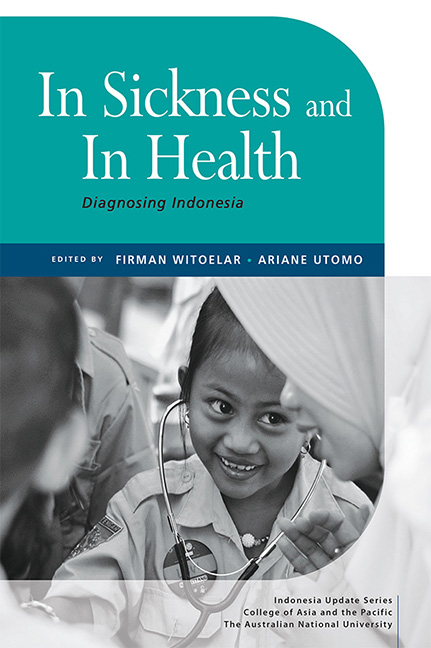6 - Pill pushers: Politics, money and the quality of medicine in Indonesia
Published online by Cambridge University Press: 09 January 2024
Summary
Law No. 9/1960 on Basic Health declared that all Indonesians had the right to be physically, mentally and spiritually healthy, while Article 8 declared the government responsible for ensuring that all Indonesians had access to health services. Four decades then passed before President Megawati Sukarnoputri, in her last act as head of state, signed legislation supporting universal health insurance. Although her successor did little to advance the health care agenda nationally, initiatives at the district level established that the provision of ‘free’ health care played very well at the ballot box (Rosser et al. 2011). One of the beneficiaries was Joko Widodo. As governor of Jakarta, he enthusiastically rebranded a city health insurance scheme inherited from his predecessor, taking credit for the popular Jakarta Health Card (Kartu Jakarta Sehat, KJS). When Widodo ran for president in 2012 under the banner of Sukarnoputri’s Indonesian Democratic Party of Struggle (Partai Demokrasi Indonesia-Perjuangan, PDI-P), he promised to extend the scheme nationwide should he win, thus cementing universal health coverage as a PDI-P legacy (Pisani et al. 2017).
When Indonesia’s mandatory, universal, single-payer insurance system (Jaminan Kesehatan Nasional, JKN) was formally launched in 2014, it was thus freighted with political importance. Many vested interests were involved in preparing for that launch, including those of the powerful state insurance firms which preceded JKN’s implementer, Badan Penyelenggara Jaminan Sosial Kesehatan (BPJS-K). The details of the scheme’s implementation were thus hammered out largely on the anvil of political expedience rather than through careful technical calculus (Aspinall 2014). The result was a generous insurance program that could not cover its costs. For Rp 25,500 a month (covered by the government for the poor and near-poor), all Indonesians had a right to full coverage for a wide range of care, including sophisticated procedures such as hip replacements. Many hospitals provided private rooms for patients paying ‘first class’ premiums of Rp 80,000 per month. The price of diagnostic tests and all 300-odd medicines on the national essential medicines list was included at all levels, with no co-payments required (Mboi 2015).
Unsurprisingly, the scheme ran at a deficit from its inception until premiums rose in 2020.
- Type
- Chapter
- Information
- In Sickness and In HealthDiagnosing Indonesia, pp. 88 - 110Publisher: ISEAS–Yusof Ishak InstitutePrint publication year: 2022

